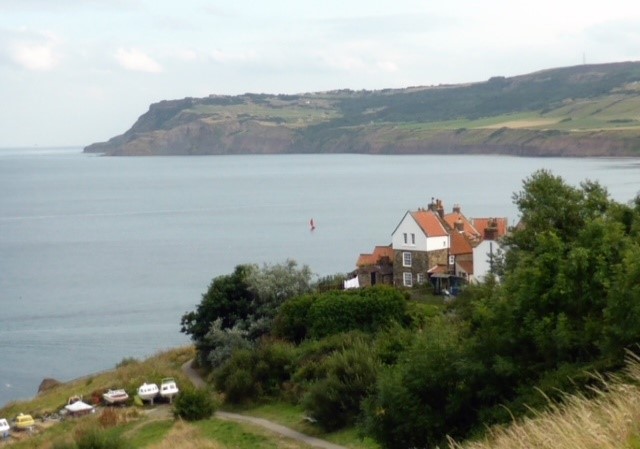
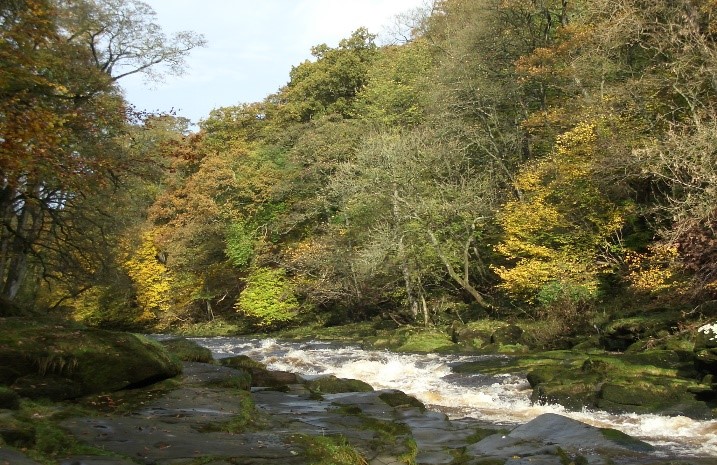
Dear Friends
Sabbath
I start with a wee admission. I’m a big fan of ‘To do’ lists. Especially when it is colour-coded in rainbow colours. There’s something really satisfying about being able to tick off items when they are complete.
When I was training for ministry, I remember one close mentor telling/warning me that: ‘in ministry, the ‘to do list’ never ends.’
Another experienced minister, recently expressed to me: ‘at the end of the week throw out your ‘to do list’, God doesn’t mind that every task may not be finished. Then rest and make a new one.’
Turning to the Bible, Exodus 20: 8-10 which reads:
“Remember the sabbath day, and keep it holy. Six days you shall labour and do all your work. But the seventh day is a Sabbath to the Lord your God.”
In this context, the Israelites are encouraged to observe the Sabbath, which means work or activity and rest are recognised as part of a symbiotic relationship. The word Sabbath extends beyond rest and comes from the Hebrew ‘shabbat’ which means ‘stop’, ‘cease’, ‘be complete’. Indeed, sabbath is not simply the absence of work or activity but incorporates an holistic way of living and recognising and experiencing the presence of God.
One of the key ways that I nourish my relationship with God as well as find rest and refreshment is walking: in the hills, in the woods or by the sea with Maisie. For me, it is in these locations where God feels so palpably close and I am intimately interconnected with all living beings. The words of Wendell Berry resonate strongly: “Sabbath observance invites us to stop. It invites us to rest. It asks us to notice that while we rest, the world continues without our help. It invites us to delight in the world’s beauty and abundance.”
I wonder, what ways do you stop and notice the presence of God in your life? Is it your nature? In relationships with other people? Is it in a piece of music or art? Or something completely different?
Nicola
| CALENDAR | |||
| 2nd | SUNDAY | 10.45am | Morning Worship led by Rev Phil Chilvers |
| 5th | Wednesday | 9.30am | Elders’ Meeting |
| 9th | SUNDAY | 10.30am | Morning Worship at West Park URC led by Rev Geoff Ellis |
| 13th | Tuesday | 12.30pm | Guild Lunch |
| 16th | SUNDAY | 10.45am | Morning Worship led by Rev Phil Chilvers |
| 12.00pm | Annual General Church Meeting | ||
| 23rd | SUNDAY | NO MORNING WORSHIP (Leeds 10k run) | |
| 30th | SUNDAY | 10.45am | Morning Worship, including the Sacrament of Holy Communion, led by our Minister, Rev Dr Nicola Robinson. We shall be joined by our friends from Headingley Methodist Church. |
| 2.30pm | Charity Concert for Wheatfields Hospice by Leeds Male Voice Choir | ||
CHARITY CONCERT
LEEDS MALE VOICE CHOIR—30TH JUNE AT 2.30pm
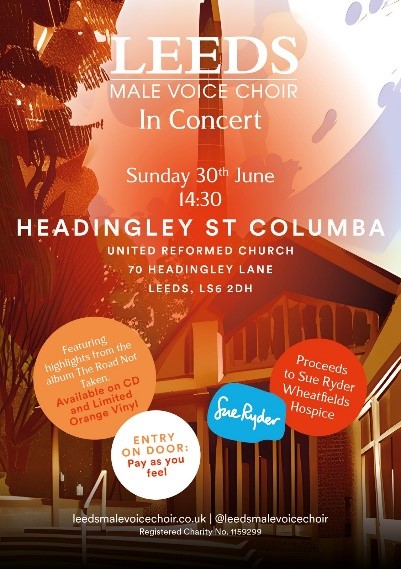 PLEASE support our Charity Concert for Wheatfields on Sunday 30th June.
PLEASE support our Charity Concert for Wheatfields on Sunday 30th June.
We are most fortunate that Leeds Male Voice Choir has offered to perform another concert this year following the great success of their concert last September.
We shall need some help with catering in the interval but the main way YOU can help is by encouraging friends, family and neighbours to join us that afternoon. And if you can also distribute flyers – available soon – to local shops and organisations that will be greatly appreciated.
There are no tickets to sell and no charges on the door just the promise of a very enjoyable concert with a varied programme—and the hope that those who come will show their appreciation with a generous donation to Wheatfields.
GUILD LUNCH
This month’s lunch is on Tuesday, 11th June. We meet, as usual at about 12.30pm for lunch at 1 o’clock. Each month I write that all are welcome – so do think about coming if you are free that week. We are pleased that Nicola usually joins us, too, so it is an opportunity to have a chat with her. If transport is a problem just mention it to Elissa or Susan or Aleck.
TO MOW OR NOT TO MOW?
‘No Mow’ May has nearly gone and, as we did not hold services at Headingley St Columba for two Sundays this month, you may not have noticed that it was decided to support the scheme.
The idea of ‘No Mow May’ is that during this period spring flowers get a foothold to feed bees, butterflies and other pollinators during the summer. Apart from the flowers, some creatures, such as hedgehogs and voles, like scuffling around in long grass searching for caterpillars and beetles. On the other hand, thrushes and blackbirds find it easier to seek out worms and insects in short grass.
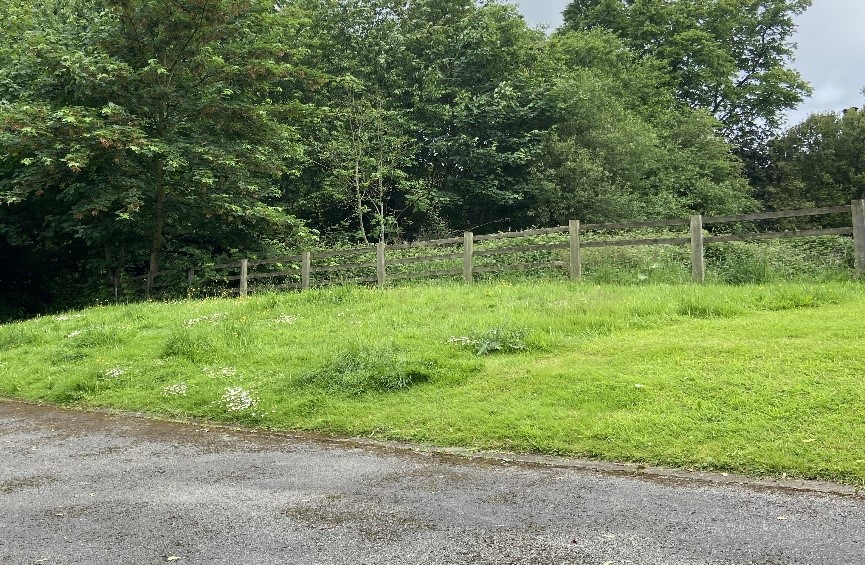 Brenda championed the idea and, after some discussion, the pragmatic decision was made to keep some areas neat and tidy (the strips bordering the car park) while leaving other areas to grow freely.
Brenda championed the idea and, after some discussion, the pragmatic decision was made to keep some areas neat and tidy (the strips bordering the car park) while leaving other areas to grow freely.
There has been discussion by both professional and amateur gardeners about the efficacy of the scheme but with all agreeing that a permanent area of wildness within a garden is the best solution. We are fortunate in having large green natural spaces around the church and in having David and Richard to look after the more formal flower beds and areas of grass that are our responsibility. (Ironically many gardeners would have been grateful to have the opportunity to make a decision about mowing, for, by and large, as it has been hard to find half an hour between showers and downpours in which to do it.)
A SUNNY AFTERNOON
Do you have a weather app on your phone or iPad (other devices are available) and I wonder if you, too, could not resist watching the changing the forecast for Sunday, 19th May when a Pentecost Picnic for the Partnership was planned? Naturally the forecast swung from rain to sun to cloud and back again, leaving us wondering, even that morning, whether to put tables and chairs on the patio or in the hall. Brenda and David had already put up the bunting and by midday the decision was made and all was set fair for a proper picnic.
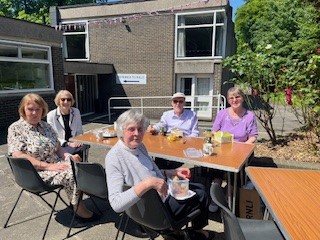 By 1 o’clock we were joined by friends from all over the Partnership who enjoyed sitting in the sun and having lunch in fellowship together.
By 1 o’clock we were joined by friends from all over the Partnership who enjoyed sitting in the sun and having lunch in fellowship together.
Lunch was followed by a Pentecost Service arranged by all the Ministry Team with the story being told (plus appropriate sound effects by Geoff) and thought given to the spread of the Spirit in our communities. We sang and even managed a worship song as a round. It was a joyful occasion and a pleasure to host so many friends from across the city.
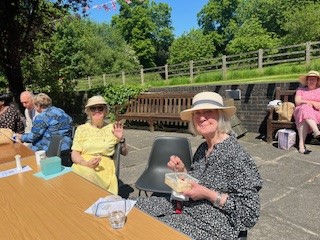
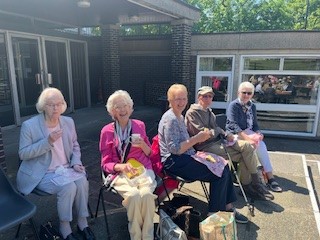
I think most of us would be lost at all levels were we to time-slip ourselves into a modern school. Many lessons would be incomprehensible and the syllabus of others totally changed. My R.E. lessons, based predominantly on Christianity, taught us stories from the Old Testament and the Story of Christ from his Nativity to the birth of the early Church. I particularly remember discussions on the Parables and Miracles and drawing maps of Paul’s travels as we learnt about the spread of Christianity.
At this time of the year when we have just celebrated Pentecost and Trinity Sunday it is hard not to think about the early church and the bravery and commitment of those early Christians.
One of those early disciples was Barnabas, a Jew from Cyprus who, it is recorded, sold his possessions to support the Apostles and their work within the early church in Jerusalem. He had a fundamental influence when he supported Saul on his return to Jerusalem after his conversion on the road to Damascus.
On arriving at Damascus Saul had preached fearlessly about God’s love shown through Jesus – angering the Jewish authorities – and he had made a daring escape in a basket lowered through the city walls, but how could the Apostles trust a man who had been determined to eradicate them so recently? But Barnabas had faith in Saul and, later, this led him to seek him out in Tarsus and take him to work alongside him in Antioch (in Syria) for a year after they, along with other Apostles, fled persecution in Jerusalem.
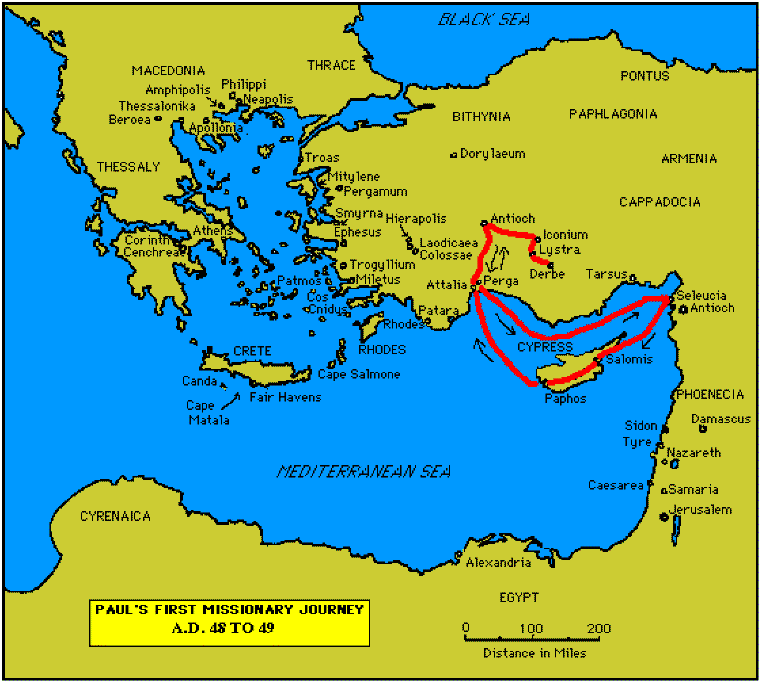 Together they planned and made the first recorded missionary journey which initially took them to Cyprus.
Together they planned and made the first recorded missionary journey which initially took them to Cyprus.
They were supported by John Mark but he left them during the journey as they left the island to continue their travels. Churches were seeded wherever they travelled all over the north eastern mediterranean. Paul and Barnabas continued to work together in Antioch and Jerusalem, but some years later when Paul planned a second major journey the problem of Mark’s early departure returned and, despite Barnabas’ support, Paul would not include him. They parted company and Paul travelled instead with Silas, and Barnabas returned to work in Cyprus with John Mark. There was no long term animosity and Paul mentions Barnabas in a letter to the Corinthians where he rails against the fact that other apostles are supported financially but they both have to work for a living. (1 Corinthians 9) A plea for equality that sounds very personal.
Barnabas is central to the growth of the early church. Supporting it financially, convincing the Apostles of Paul’s conversion, mentoring him in the early years of his faith and then prepared to share leadership with him as he witnessed his leadership qualities. Barnabas did not write as much as Paul, travel as much as Paul (for it is estimated he travelled almost 10,000 miles in 14 years) or now be remembered in the same way but perhaps he was a less challenging and more sympathetic companion.
‘Barnabas, known as the “Son of Encouragement,” emerges as a pivotal character in the Acts of the Apostles and exemplifies the Christian virtues of generosity, leadership, and reconciliation.’
He is remembered by the church on 11th June.
GREAT ORMOND STREET HOSPITAL FOR CHILDREN
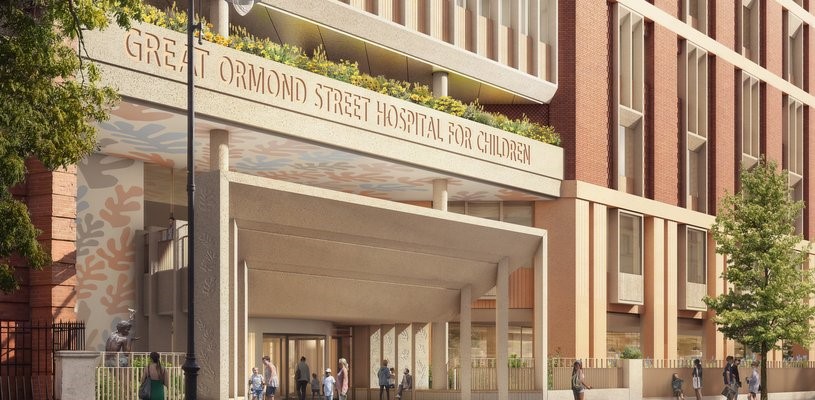 Recently, it seems that every time I go outdoors to the garden or for an afternoon walk, it starts to rain. This has resulted in my watching far too much afternoon TV. Although I enjoy watching David Suchet’s excellent portrayal of ‘Poirot’, I have been struck by the number of TV adverts about well known charities holding lotteries to boost their funds.
Recently, it seems that every time I go outdoors to the garden or for an afternoon walk, it starts to rain. This has resulted in my watching far too much afternoon TV. Although I enjoy watching David Suchet’s excellent portrayal of ‘Poirot’, I have been struck by the number of TV adverts about well known charities holding lotteries to boost their funds.
One of these is London’s famous Children’s hospital Great Ormond Street, who are raising money for a new paediatric cancer wing. I have very fond memories of GOS. When I was a young medical student in my 4th year at the Middlesex Hospital Medical School in 1969, I chose to do my three month ‘elective period’ at GOS, as I had thoroughly enjoyed my attachment to paediatrics at the Middlesex and Hackney Children’s hospitals. I was attached to Dr Phillip Rainsford Evans, an internationally renowned paediatric physician who had recently returned from working in Saigon, where he had been involved in the development of a new hospital during the Tet offensive. He brought back some of his team and his ward rounds at GOS were often conducted in French. I was very fortunate that Dr Evan’s Senior House Office was willing to teach and let me undertake a lot of practical procedures under supervision. I saw a wide variety of common and rare childhood illnesses and I was given a bed-sitting room in Red Lion Square, so that I could be on call. I attended the weekly, international, post-graduate meetings and I shall never forget Prof Wilkinson’s lecture on magnesium; he began by dowsing the lights and then there was a blinding flash as he exploded several photo flash bulbs on the front bench. As we gradually regained our vision, he announced ‘that Ladies and Gentlemen is magnesium’.
I returned to the Middlesex definitely considering applying for the post of House Physician in Paediatrics, if I passed my Finals. In fact, I became a House Physician in adult medicine at Welwyn Garden City and some years later, now following a career as a general physician, specialising in Renal (kidney) Medicine, I returned to GOS to attend the meetings of the UK Renal Association which met at the Institute of Child Health attached to GOS. And, as part of my training as a Senior Registrar at the Royal London Hospital, I returned to GOS to learn about managing paediatric kidney problems and was attached to Prof Martin Barrett and Prof Mike Dillon. On Friday mornings I attended the Urology Surgical meeting at 8.30 am, where specialists from all over the world came to learn about managing rare surgical problems from Mr D I Innes Williams, an internationally renowned Paediatric surgeon.
I was appointed as a Consultant Physician with an interest in Renal Medicine to the General Infirmary at Leeds in 1980. Apart from treating patients, my other main interest was in teaching both at under-graduate and post-graduate level. Post- graduate teaching and examinations are the province of the Royal College of Physicians and, after becoming involved in Membership exams – the highest level of exams taken by Physicians – around the UK and then in the RCP examination centres abroad, I felt very honoured to be appointed a Censor for the Royal College. Censors have the responsibility of overseeing the running of the College, particularly in relation to education and examinations.
One day, an unexpected invitation arrived in the post from Mr DI Innes Williams, inviting me to the re-opening by the Princess Royal of the recently refurbished, famous Hunterian Museum at the Royal College of Surgeons. Apparently, many years ago, the College of Surgeons was indebted to the RCP and made their Censors Trustees of the Hunterian Museum; a role I was certainly not aware of! I met Mr Williams again that afternoon and was flattered that he remembered me. I sincerely hope that the appeal for the new cancer unit at Great Ormond Street goes well. It is is one of the world’s leading children’s hospitals and I feel very proud and privileged to have had a brief, but memorable, association with GOS.
Aleck
